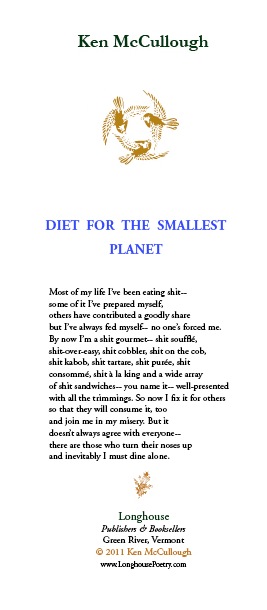KEN MCCULLOUGH
TRIGGERS
“ …that which we call a rose
By any other name would smell as sweet.”
Juliet
Romeo and Juliet, Act II, sc.1
There were lots of wild plum trees in
the fencerows,
and when they bloomed, they put out a
sweet smell
and there are lilacs on almost every
farm; in fact,
that big hedgerow over by you has been
there forever.
And in the springtime the aroma of the
apple trees.
When the white blossoms of the honey
locusts
come in, they are pretty to look at,
and fragrant, too,
but people think of them as nothing
more than weeds.
And this time of the year everybody’s
spreading manure
or now its maybe emptying the pit. It
smells like liquid gold
because commercial fertilizer costs so
much.
The rain itself has a really great
smell that I’m sure
is different in different places. But
one of the nicest smells
of course, is hay, that’s new cut,
alfalfa, and then if
its conditioned, crinkled a bit, the
smell of hay when its
dry and ready to bale—or a load of hay
in the barn
if it isn’t heating, a load that’s
dried and stored.
With good silage I have to pick it up
and smell it
because it’s so good. If you are
filling silo, a lot
of the silage spills out the side and
if you don’t
clean it up and it rains overnight and
then it gets
hot and muggy and starts molding—that’s
a whole
nuther smell, a bad one, like rancid
butter
but one you’d recognize right away. When you
get it on your clothes, it won’t come off. Both our
families were German—we made silage the same way
we made sauerkraut. Dairy farmers back east made it
from green corn fodder and it caught on out here.
There’s the smell of the dairy barn,
summer or winter.
We used to milk by hand so you smelled
the milk
in the pail and that had a very nice
vapor to it.
Even
the cows, their breaths can be bad or
it can be pretty good if they are
happy—so
a contented barn has its own certain
smell, too.
After the cows go out in the pasture,
the manure
is loose, it’s very fresh, distinctive,
mixed with
the grass, and they’re crushing the
grass, and
lying on it, so when the cows are
pasturing
there’s a tremendous number of smells
that
would trigger your memories of this
place.
We used to have hives up here, and when
it was hot, the bees would be fanning.
I’d move in close and the action of
their wings
would waft the smell of honey from the
boxes.
There are still some wild plums down in
the woods
but very few. They used to be kind of
thick
in the fencerows --our neighbor,
George,
instead of cleaning out the fencerow
he’d just move the fence in a little
more
so it came to be about 16 feet wide.
So we had to cut that back. We must
have
grubbed out all the plums when I was
in high school, which was bad for the
birds
but simplified things. That’s where all
the plums were.
We did save a few, transplanted here in
the yard
so I can still breathe in their scent,
taste that tart jam.
Thanks to Bob Redig 8/25/14
KEN MCULLOUGH

Ken McCullough. Diet For The Smallest Planet. In three-color fold out performance.
Foldout booklet. $10 postpaid from Longhouse. McCullough’s most recent books of poetry are Walking Backwards, Sicomoro.Oropéndola (published in Colombia), and Broken Gates, as well as a book of stories, Left Hand. He has received numerous awards for his poetry. McCullough has worked closely with Cambodian poet U Sam Oeur, survivor of the Pol Pot regime; they have published Sacred Vows, a bilingual edition of U’s poetry, and Crossing Three Wildernesses, a memoir. McCullough has two sons, Galway and Orion. He lives on a farm outside Winona, MN with his wife, Lynn Nankivil, a playwright. In 2014, McCullough will start his second term as Poet Laureate of Winona.






































